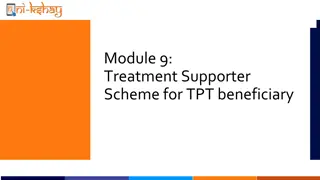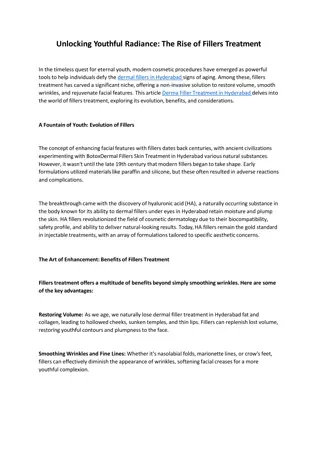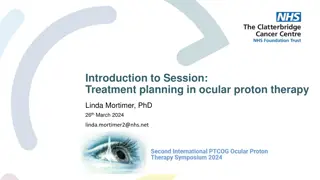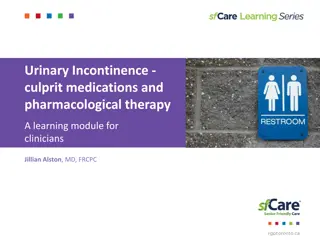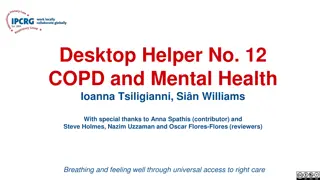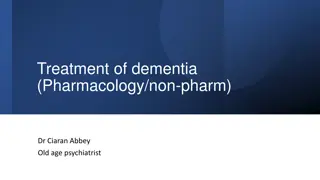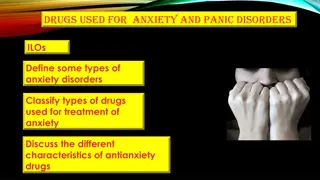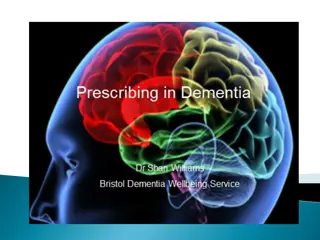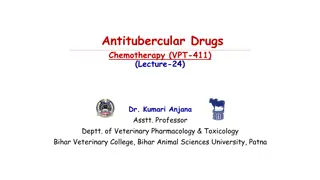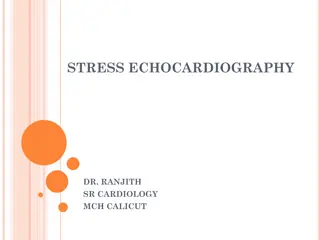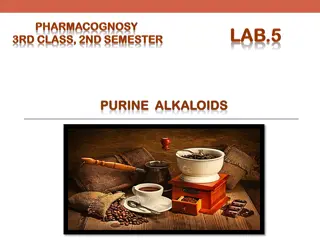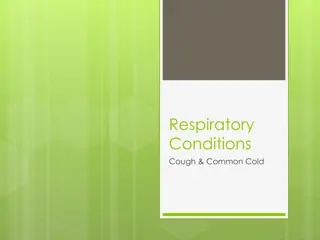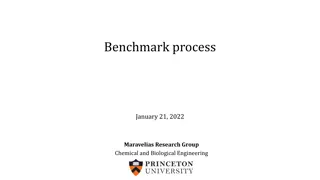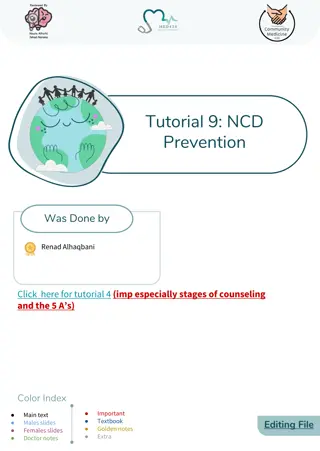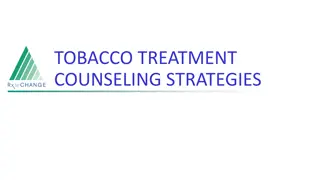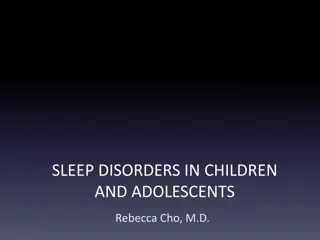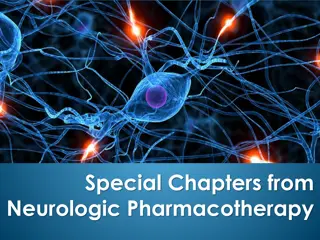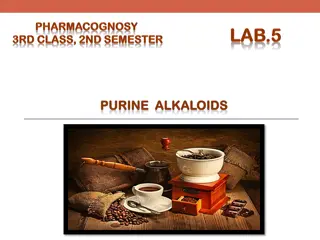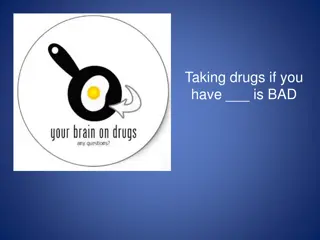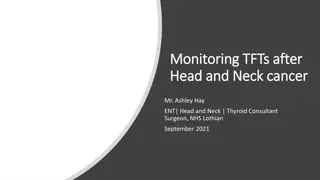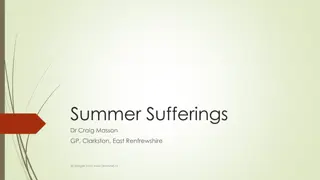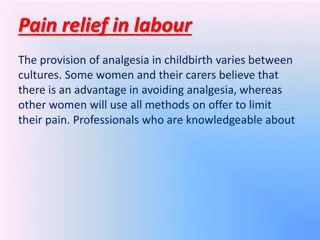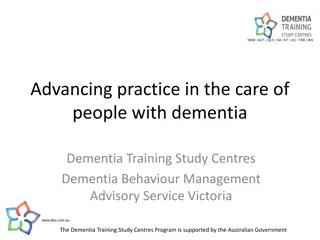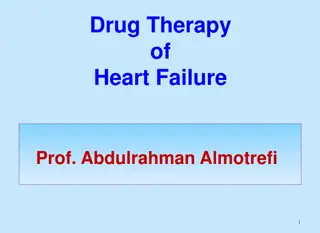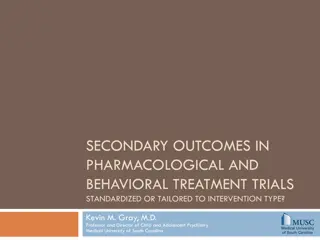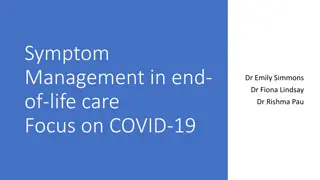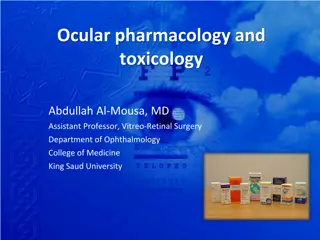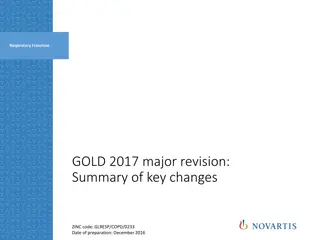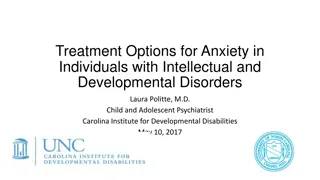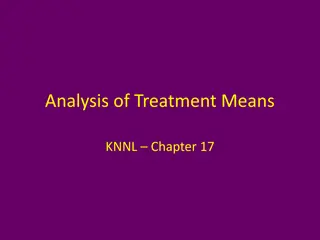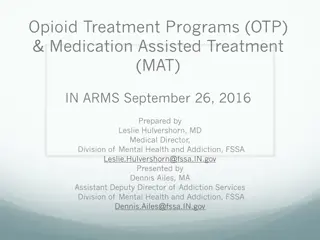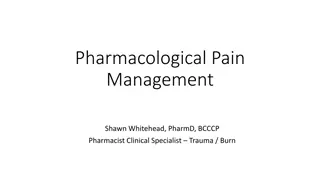Treatment of Acute malnutrition using Simplified Approaches.
Simplified approaches in the treatment of acute malnutrition involve modifications to existing protocols to optimize effectiveness, quality, and cost-efficiency. These approaches include family MUAC screening, CHW-led treatment, reduced follow-up visits, expanded admission criteria, single treatment
1 views • 15 slides
Appropriate use of antipsychotics for changed behaviours in people living with dementia
Dementia is characterized by various changes, including behaviours such as wandering, disinhibition, agitation, and aggression. People living with dementia require care that can be approached through non-pharmacological and pharmacological strategies. The overreliance on psychotropic medications lik
0 views • 25 slides
Opioid Use Disorder Treatment Guidelines 2024
The February 2024 NYSDOH AIDS Institute Clinical Guidelines Program focuses on assisting clinicians in engaging with patients about opioid use disorder (OUD) treatment goals, emphasizing overdose prevention, providing updated information on available treatment options, and offering recommendations f
2 views • 24 slides
Treatment Supporter Scheme for Tuberculosis Preventive Treatment Beneficiaries
Treatment Supporter Scheme provides assistance to TPT beneficiaries in completing their treatment. Treatment Supporters can be various individuals including Medical Officers, MPWs, and community volunteers. Their role involves educating beneficiaries about TPT treatment, ensuring medication adherenc
1 views • 21 slides
Dermal Filler Treatment | Fillers Treatment in Jubilee Hills, Hyderabad
We offer best skin care treatment in jubilee hills, hyderabad. specialized in fillers treatment, injectible fillers treatment, we have top class dermatologist for dermal fillers treatment
0 views • 2 slides
Advances in Ocular Proton Therapy Treatment Planning
Explore the intricate world of ocular proton therapy treatment planning with Dr. Linda Mortimer, PhD. Discover the fundamental elements of an ocular treatment plan, main goals of treatment planning, an overview of dedicated ocular Treatment Planning Systems (TPS), planning workflows, choice of TPS,
2 views • 12 slides
Understanding Osteogenesis Imperfecta: Causes, Types, and Treatment
Osteogenesis Imperfecta is a genetic disorder affecting bones, with various types ranging from mild to severe. It is caused by mutations in specific genes and is characterized by bone fragility, fractures, and other skeletal deformities. Diagnosis involves clinical and genetic tests. Management incl
1 views • 13 slides
Understanding Medications and Pharmacological Therapy for Urinary Incontinence
This learning module for clinicians discusses the physiology of bladder control, age-related changes in the genitourinary system, medications that contribute to urinary incontinence, pharmacological treatments for UI, side effects of medications used for UI, and a senior-friendly approach to optimiz
0 views • 30 slides
Managing Mental Health in COPD Patients: Practical Insights and Interventions
Mental health issues are prevalent among COPD patients, affecting about 30% to 80% with comorbid depression and anxiety. This article aims to raise awareness among primary care professionals about identifying and managing mental health problems in COPD patients. Strategies include non-pharmacologica
1 views • 11 slides
Comprehensive Overview of Dementia Treatment Strategies
Dementia, a syndrome resulting from various diseases affecting nerve cells and brain function, leads to cognitive decline. Treatment approaches include pharmacological and non-pharmacological interventions such as biomarker monitoring, lifestyle modifications, and addressing risk factors like hypert
0 views • 12 slides
Overview of Anxiety Disorders and Antianxiety Drugs
Anxiety disorders are conditions characterized by excessive worry and fear that can interfere with daily life. Common types include generalized anxiety disorder, panic disorder, phobias, and OCD. Treatment options include psychotherapy and anxiolytic drugs such as benzodiazepines, 5HT1A agonists, be
0 views • 25 slides
Pharmacological Management of Alzheimer's Disease and Cognitive Enhancers
Cognitive enhancers play a crucial role in managing Alzheimer's Disease, with Cholinesterase inhibitors (AChEI) like Donepezil, Galantamine, and Rivastigmine recommended for mild to moderate AD, and Memantine for moderate to severe cases. These medications act through different mechanisms, with AChE
0 views • 46 slides
Overview of Antitubercular Drugs: Introduction, Classification, and Applications
Tuberculosis is a chronic granulomatous disease caused by Mycobacterium bovis in ruminants and Mycobacterium avium in dogs and pigs. These bacteria have a unique waxy appearance due to their cell wall composition, providing a shield against pharmacological compounds. Antitubercular drugs play a cruc
3 views • 28 slides
Advanced Treatment Processes for Faecal Sludge Management
Treatment processes for faecal sludge management involve various stages including preliminary treatment, primary treatment, secondary treatment, and tertiary treatment. Each stage employs mechanical, biological, and chemical processes to separate, decompose, and remove contaminants from the sludge,
0 views • 7 slides
Comprehensive Guide to Stress Echocardiography in Cardiology Practice
Stress echocardiography is a valuable tool in diagnosing and managing coronary artery disease, valvular heart disease, and assessing heart function. This imaging technique helps in detecting flow-limiting stenosis, understanding the ischemic cascade, and evaluating cardiac function during stress. Va
0 views • 49 slides
Understanding Purine Alkaloids and Their Pharmacological Activities
Purine alkaloids are a class of compounds with a unique structure, different from typical alkaloids. They include caffeine, theophylline, and theobromine, each with distinct effects on the body. These compounds are found in plants like coffee, tea, and cola, and have various pharmacological activiti
4 views • 15 slides
Aquatic Treatment Systems for Wastewater Reclamation and Reuse
In aquatic systems, wastewater treatment involves bacterial metabolism and sedimentation, with aquatic plants playing a role in improving treatment capabilities. This article discusses the functions of aquatic plants in treatment systems and the categories of wetlands used for wastewater treatment,
1 views • 15 slides
Understanding Cough and Common Cold
Cough is a reflex action to clear airways, often caused by viral infections. It can be productive or non-productive, acute, sub-acute, or chronic. Assessing cough duration, nature, associated symptoms, drug-induced or condition-induced factors is crucial. Non-pharmacological treatments include steam
1 views • 31 slides
End-of-Life Symptom Management for COVID-19 Patients: A Comprehensive Guide
This comprehensive guide focuses on symptom management in end-of-life care for COVID-19 patients, covering identification of signs of dying, communication with residents and families, recognition of end-of-life symptoms, and pharmacological/non-pharmacological approaches. It also provides valuable r
0 views • 19 slides
Benchmark Process in Chemical and Biological Engineering Research Group
The benchmark process conducted by the Maravelias Research Group in Chemical and Biological Engineering focuses on wastewater treatment efficiency and performance metrics. The process includes various stages such as secondary treatment, preliminary treatment, primary treatment, disinfection, and bio
0 views • 7 slides
Smoking Cessation Counseling for a 44-Year-Old Man
Abdullah, a 44-year-old man, seeks help to quit smoking. This tutorial covers the counseling approach for smoking cessation, including history-taking, discussing smoking habits, addressing concerns like fear of lung cancer, and incorporating the 5 A's approach: Ask, Advise, Assess, Assist, and Arran
0 views • 9 slides
Tobacco Treatment Counseling: Strategies and Guidelines for Clinicians
Effective tobacco treatment counseling strategies, including addressing physiological and behavioral aspects of dependence, offering pharmacological treatments, and utilizing various clinician types, can significantly increase the likelihood of successful smoking cessation. Clinician interventions p
0 views • 44 slides
Understanding Sleep Disorders in Children and Adolescents
This informative presentation by Dr. Rebecca Cho delves into the complexities of sleep architecture and physiology across different life stages. It explores various pediatric sleep disorders, their comorbidities, and the potential developmental consequences of sleep disruption. The discussion also c
0 views • 49 slides
Pharmacotherapy Overview of Parkinson's Disease and Related Disorders
Overview of pharmacological treatment options for Parkinson's disease and related conditions like choreatic dyskinesias, spastic disorders, and myasthenia gravis. Describes the degenerative process of Parkinson's disease, its symptoms, and the pharmacological interventions targeting dopamine deficit
0 views • 26 slides
Understanding Purine Alkaloids: Properties, Isolation, and Pharmacological Activities
Purine alkaloids are a group of compounds with unique characteristics, such as a heterocyclic nucleus and specific methylated forms like caffeine, theophylline, and theobromine. While they have diverse pharmacological activities like CNS stimulation and diuretic effects, their identification often i
0 views • 16 slides
Substance Abuse Treatment Strategies and FDA-Approved Medications
Explore the various substance abuse treatment approaches, including psychological and pharmacological interventions, along with FDA-approved medications like disulfiram, naltrexone, and buprenorphine. Learn about the challenges in substance abuse treatment and the psychology of substance users. Disc
0 views • 13 slides
Monitoring Thyroid Function After Head and Neck Cancer Treatment
This collection of images and data discusses the importance of monitoring thyroid function after head and neck cancer treatment, specifically focusing on post-treatment thyroid function tests, audits of practices in head and neck units, thyroid function post laryngectomy, and the significance of det
0 views • 11 slides
Summer Sufferings: Treatment Options for Hay Fever and Related Conditions
Dr. Craig Masson, a GP in Clarkston, East Renfrewshire, discusses prescribing and non-prescribing options for hay fever, sinusitis, prickly heat, urticaria, and Lyme disease. The content covers the challenges of managing hay fever symptoms including grass and pollen allergies, and suggests non-pharm
0 views • 24 slides
Exploring Pain Relief Options in Labor
Provision of analgesia during childbirth varies among cultures, with some women preferring non-pharmacological methods like relaxation, breathing exercises, and warm water immersion, while others opt for pharmacological options such as opiates. Professionals play a crucial role in advising women on
0 views • 23 slides
Advancing Dementia Care: Treatment Options and Management Strategies
This content delves into the strategies for advancing the care of individuals with dementia, focusing on treatment and management options. It discusses the role of pharmaceuticals, legal considerations, safety measures, and the importance of avoiding physical restraints in dementia care. Non-pharmac
0 views • 13 slides
Comprehensive Overview of Wastewater Treatment Systems and Processes
This detailed profile showcases Rajesh Bhagat's extensive academic and professional achievements in environmental engineering, focusing on wastewater treatment. It covers various treatment processes such as secondary treatment, sludge digestion, preliminary treatment, and primary treatment. Referenc
0 views • 53 slides
Drug Therapy of Heart Failure
Explore the various classes of drugs used for treating acute and chronic heart failure, including their mechanisms of action, pharmacological effects, clinical uses, adverse effects, and interactions with other drugs. Learn about the causes, symptoms, pathophysiology, and factors affecting cardiac o
0 views • 51 slides
Understanding Secondary Outcomes in Pharmacological and Behavioral Treatment Trials
This presentation by Dr. Kevin M. Gray explores key considerations in intervention trials, addressing stages of investigation, types of treatments, trial designs, and target populations. The importance of balancing mechanistic and functional outcomes across trial phases is emphasized for meaningful
0 views • 18 slides
Symptom Management in End-of-Life Care: Focus on COVID-19
Review signs of dying, communicate effectively with residents and families, identify end-of-life symptoms (especially related to COVID-19), and explore non-pharmacological and pharmacological approaches for symptom management. Resources and guidance are provided for caring for individuals in the com
0 views • 19 slides
Understanding Ocular Pharmacology: General Principles and Drug Delivery
The study of ocular pharmacology involves understanding general pharmacological principles, pharmacodynamics, and pharmacokinetics. Drugs can be delivered to ocular tissue locally via eye drops, ointments, injections, or systemically through oral or intravenous routes. Factors such as drug concentra
0 views • 58 slides
GOLD 2017 Major Revisions in COPD Management
GOLD 2017 introduces significant changes in Chronic Obstructive Pulmonary Disease (COPD) management, focusing on areas like defining COPD, assessment tools, pharmacological management, inhaler techniques, and comorbidity management. The updated definition emphasizes persistent respiratory symptoms.
0 views • 17 slides
Treatment Options for Anxiety in Individuals with Intellectual and Developmental Disorders
Explore unique presentations of anxiety in individuals with intellectual and developmental disorders, evaluate evidence-based interventions - both pharmacological and non-pharmacological, review practical strategies for managing anxiety symptoms, and identify barriers to treatment and future researc
0 views • 38 slides
Statistical Analysis of Treatment Means in Experimental Studies
The content discusses various statistical methods to analyze treatment means in experimental studies, including KNNL models, main effects plots, inference for individual treatment means, comparing two treatment means, and contrasts among treatment means. It covers topics such as parameter estimation
0 views • 25 slides
Understanding Opioid Treatment Programs and Medication-Assisted Treatment
Opioid Treatment Programs (OTPs) and Medication-Assisted Treatment (MAT) integrate behavioral therapy with medications for substance use disorders like opioid dependency. Combining medications with counseling offers a holistic approach to help individuals reduce or stop opioid use. The summary cover
0 views • 41 slides
Comprehensive Overview of Pharmacological Pain Management Strategies
This comprehensive overview covers various aspects of pharmacological pain management, including behavioral measures for patients unable to self-report pain, building pain regimens, NSAIDs use and associated risks, NSAIDs and COX selectivity, clinical presentation of pain symptoms, gabapentinoids fo
0 views • 22 slides



